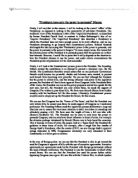The Electoral College has often been dubbed a ‘loser takes all’ system, since even if a candidate loses the plurality of the popular vote (Gore/Liebermann ticket actually outpolled the Republicans by slightly more than 500,000 votes in 2000), he may still win the Presidency if he wins the Electoral College (as Bush did, with 271 votes to 267). This bizarre result is a consequence of the “Winner Takes All” system, where the winner of the state, no matter how narrow his margin of victory, is awarded all the delegates of that state. Although supporters of the Electoral College system point out that this has this anomaly has only occurred three times, this is three times too many! To have a candidate lose the popular vote, but still gain the Presidency does not reflect the democratic ideology that the Americans hold dear.
A candidate can also win the popular vote but lose the Electoral College vote because the state cannot constitutionally require its electors to vote for the candidates to whom they are pledged. Consequently, critics of the Electoral College suggest the possibility of some enormous mischief by which a significant number of electors would vote for some other candidate, thus frustrating the will of the voters. There have been at least 6 known cases when individual electors failed to vote for the candidate to whom they were pledged – in 1820, 1956, 1960, 1968, 1976 and 1988, although none of the Faithless Electors have affected an election’s outcome. Nonetheless, in a tight election, such as in 2000, a Faithless Elector has the potential to undermine a President’s legitimacy.
If there is no clear majority in an Electoral College election, the House of Representatives has the constitutional right to decide the Presidency. This can be viewed as a threat to the democratic wishes of the people, and further, could again result in a popular vote ‘loser’ winning the ‘ultimate prize’. This situation occurred twice, in 1800 and 1824, and there were fears that the 1968 election could shift in the same direction.
Further criticisms targeted at the Electoral College is that it discourages turnout since the election is indirect and many states are invariably uncompetitive. Pre-election polls provide a fairly reasonable indication of the popular vote winner in a particular state, hence many voters believe their effort in voting is futile. This is compounded by the fact that there is little incentive for individual states to increase voter turnout since they get the same number of electoral voters regardless of numbers voting. Absentee votes are also discouraged, since in the winner-takes-all system, they have no significance if the number of absentee votes is less than the margin of difference in the recorded vote.
The Electoral College system can also be accused of discriminating against third parties, since the third party support is thinly spread. This lack of concentration means that although third parties may gain votes, they cannot capture Electoral College delegates. Ross Perot’s Reform Party, for example, gained 18% of the vote in 1992 however, failed to get any delegates. Only by concentrating their vote can a third party hope to gain delegates, for example, the pro-segregationist party, the Dixiecrats, gained 39 delegates with only 2.4% of votes.
Finally, since the bigger states are more influential under an Electoral College, there is greater onus on the candidates to focus their campaigning within the states that can amass the most delegates. This results in the smaller states generally being neglected, sometimes at a candidate’s peril. Al Gore (2000) expended more time and energy in trying to win Florida that he lost his home state of Tennessee (11 Electoral College delegates), and consequently the Presidency.
It must therefore be asked why, if the Electoral College has a multitude of glaring faults, has it failed to be abolished? The most obvious explanation is that there is a lack of consensus behind any particular method of reform. Since the two leading parties benefit most from the Electoral College, they naturally oppose change, fearing that a third party could win the popular vote. In addition, reforms would require an amendment made to the constitution, not an easy feat by any means. The use of an Electoral College also upholds Federalism, since the importance of each state is recognised. By spreading electoral power around to the fifty states, the Electoral College acts as a check and balance in the Constitution against the President. Finally, there is a boost in status of large minority groups, since candidates must claim their support in order to gain a majority. An example of this leverage effect is the choice of Liebermann as Gore’s running mate, who helped gain the Jewish vote in New York.
In conclusion, the advantages that the Electoral College are endowed with are overshadowed with the disadvantages and controversy that surrounds the present system. However, the fact that chaotic elections, such as Bush-Gore 2000 election, are infrequent, combined with the reluctance of those in power to change a system that conferred that actual power, mean that any constitutional changes would have a struggle being passed. Although I agree with the view that the Electoral College is “an appendage to an anachronism” (Thurber), its roots are too deeply imbedded into the American Constitution. A more realistic solution would be evolution of the system. By allowing states to split their votes by congressional district, and then providing a bonus of two electoral votes to whoever carries the state, the electoral college vote may be brought more in line with the popular vote, as well as increasing the incentive for Presidential candidates to campaign throughout the country. As the Economist concluded, “kicking scapegoats [the Electoral College] is fun. But sometimes gentle reform makes for better government.”







